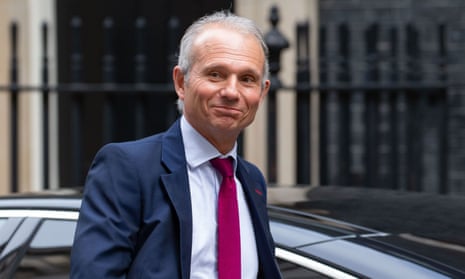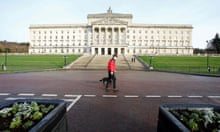The former cabinet minister David Lidington has said there would have to be direct rule in Northern Ireland if the local parties did not agree to return to power-sharing by 31 October.
Northern Ireland has been without a devolved assembly since January 2017 after a serious erosion of trust between the two main parties Sinn Féin and the Democratic Unionist party.
Lidington, who was Theresa May’s de facto deputy prime minister when she was in No 10, told BBC Radio 4’s Today programme: “There will have to be some kind of direct rule and, I think, it’s important that the government gets that sorted and in place, before the end of October.”
“At the moment, the Northern Ireland civil service has no power to do things like give emergency support to farmers or food producers whose supply chains into the Irish Republic could be completely killed by a no-deal exit.
“The civil service of Northern Ireland does not have any power to help in those circumstances or to take other emergency measures that would be needed in the event of no deal.
“I think it would be unconscionable to leave any part of the United Kingdom without proper governance in the circumstances of that kind of crisis and for Northern Ireland, in particular, where the politics is fragile, the case is stronger than anywhere else to get this sorted in advance.”
The Northern Ireland secretary, Julian Smith, hinted this week that the government would move to impose direct rule in the coming weeks if the parties did not agree to start up the executive body again.
“If we cannot secure the restoration of an executive we will pursue the decision-making powers that are needed at the earliest opportunity.”
The government has expressed concern that civil servants are not best-placed to run the region and cannot make the political decisions needed in relation to the disbursement of public funds to the NHS, police or education.
But civil servants’ powers are limited as officials are mandated to advise politicians, not make policy.
Northern Ireland has not been ruled by Westminster for more than a decade, but the collapse of power-sharing and the Brexit crisis has heightened the threat of direct rule.
A no-deal Brexit makes it more likely as key decisions would have to be taken over mitigating the consequences, especially if new laws were needed.
DUP MP Sir Jeffrey Donaldson told Radio 4 he was “ready to go into government tomorrow, we have no preconditions”. “We are ready to serve the people of Northern Ireland in a government,” he added.
Sinn Féin would oppose direct rule, with the party’s MP Chris Hazzard telling the BBC the idea of direct rule “underscores once again that the dysfunctional Tory government is in complete hock in this grubby little deal with the DUP”.









